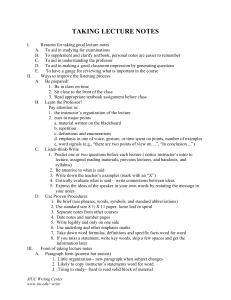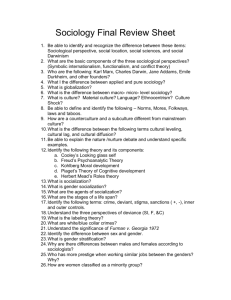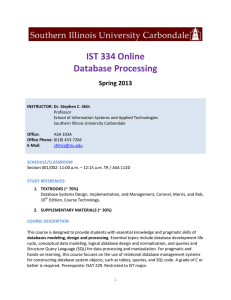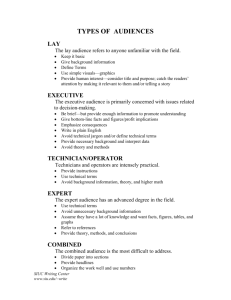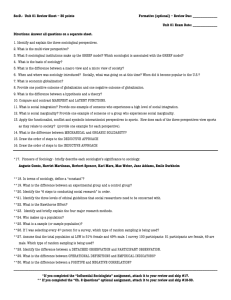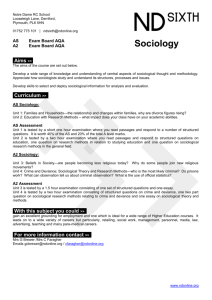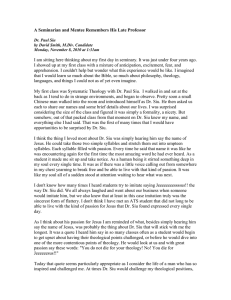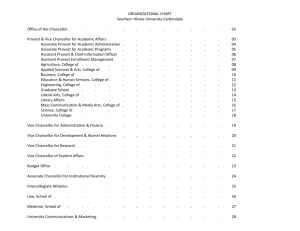Introduction to Sociology
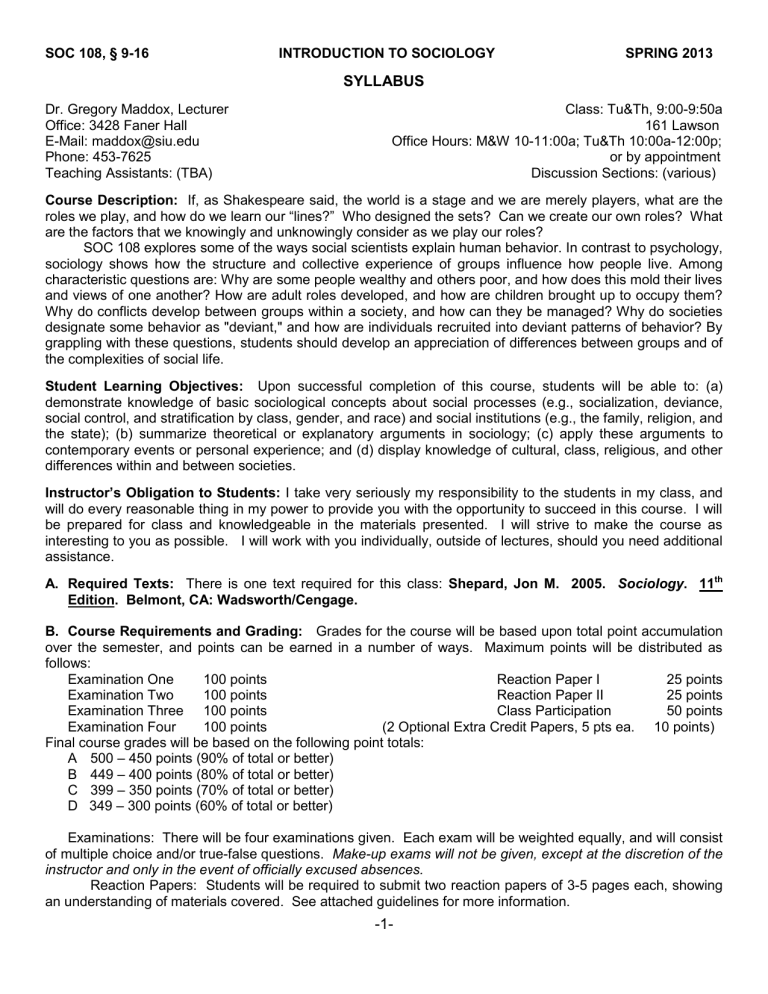
SOC 108, § 9-16 INTRODUCTION TO SOCIOLOGY SPRING 2013
SYLLABUS
Dr. Gregory Maddox, Lecturer Class: Tu&Th, 9:00-9:50a
Office: 3428 Faner Hall 161 Lawson
E-Mail: maddox@siu.edu Office Hours: M&W 10-11:00a; Tu&Th 10:00a-12:00p;
Phone: 453-7625 or by appointment
Teaching Assistants: (TBA) Discussion Sections: (various)
Course Description: If, as Shakespeare said, the world is a stage and we are merely players, what are the roles we play, and how do we learn our “lines?” Who designed the sets? Can we create our own roles? What are the factors that we knowingly and unknowingly consider as we play our roles?
SOC 108 explores some of the ways social scientists explain human behavior. In contrast to psychology, sociology shows how the structure and collective experience of groups influence how people live. Among characteristic questions are: Why are some people wealthy and others poor, and how does this mold their lives and views of one another? How are adult roles developed, and how are children brought up to occupy them?
Why do conflicts develop between groups within a society, and how can they be managed? Why do societies designate some behavior as "deviant," and how are individuals recruited into deviant patterns of behavior? By grappling with these questions, students should develop an appreciation of differences between groups and of the complexities of social life.
Student Learning Objectives: Upon successful completion of this course, students will be able to: (a) demonstrate knowledge of basic sociological concepts about social processes (e.g., socialization, deviance, social control, and stratification by class, gender, and race) and social institutions (e.g., the family, religion, and the state); (b) summarize theoretical or explanatory arguments in sociology; (c) apply these arguments to contemporary events or personal experience; and (d) display knowledge of cultural, class, religious, and other differences within and between societies.
Instructor’s Obligation to Students: I take very seriously my responsibility to the students in my class, and will do every reasonable thing in my power to provide you with the opportunity to succeed in this course. I will be prepared for class and knowledgeable in the materials presented. I will strive to make the course as interesting to you as possible. I will work with you individually, outside of lectures, should you need additional assistance.
A. Required Texts: There is one text required for this class: Shepard, Jon M. 2005. Sociology . 11 th
Edition. Belmont, CA: Wadsworth/Cengage.
B. Course Requirements and Grading: Grades for the course will be based upon total point accumulation over the semester, and points can be earned in a number of ways. Maximum points will be distributed as follows:
Examination One 100 points
Examination Two 100 points
Examination Three 100 points
Examination Four 100 points
Final course grades will be based on the following point totals:
A 500 – 450 points (90% of total or better)
B 449 – 400 points (80% of total or better)
C 399 – 350 points (70% of total or better)
D 349 – 300 points (60% of total or better)
Reaction Paper I
Reaction Paper II
Class Participation
25 points
25 points
50 points
(2 Optional Extra Credit Papers, 5 pts ea. 10 points)
Examinations: There will be four examinations given. Each exam will be weighted equally, and will consist of multiple choice and/or true-false questions. Make-up exams will not be given, except at the discretion of the instructor and only in the event of officially excused absences.
Reaction Papers: Students will be required to submit two reaction papers of 3-5 pages each, showing an understanding of materials covered. See attached guidelines for more information.
-1-
Participation: Attendance will be required . You will be allowed 3 unexcused absences over the course of the semester; for each unexcused absence beyond the 3 given, 10 points will be deducted. Attendance will be determined by the attendance sheets; it is your responsibility to make sure you sign them.
Additional points may be earned from up to two (and only two) optional papers relating course material to University events (to be cleared with Instructor prior to event).
An INC is assigned when, for reasons beyond their control, students engaged in passing work are unable to complete all class assignments. An INC must be changed to a completed grade within a time period designated by the instructor but not to exceed one year from the close of the term in which the course was taken, or graduation , whichever occurs first. Should the student fail to complete the course within the time period designated, not to exceed one year, or graduation, whichever comes first, the incomplete will be converted to a grade of F and the grade will be computed in the student's grade point average. Students should not reregister for courses in which an INC has been assigned with the intent of changing the INC grade.
Re-registration will not prevent the INC from being changed to an F .
C. Classroom Respect: A comfortable atmosphere is very important in providing for a student’s opportunity to learn. Knowing that every student comes from a different place, and because some of the topics covered in sociology can be controversial in nature, I require students to RESPECT the opinions of others, regardless of agreement. In addition, out of respect to your fellow classmates, I require that all students exercise a level of
“lecture etiquette.” This means not coming into class late and disrupting others, not talking to fellow classmates during lecture, turning off cell phones (a personal “pet peeve”), etc. To be respected means you must respect others around you.
D. Cheating/Plagiarism/Academic Dishonesty: All work you submit must be your own. This does not mean you should not rely on existing scholarship in completing your papers; in fact, using existing scholarship to support your own arguments is expected. However, you must document the scholarship of others in your work by the use of proper citation of these resources.
All SIUC policies regarding academic dishonesty will be upheld in this course. Plagiarism or academic dishonesty of any type may lead to zero points for a particular assignment, failure of the course, and/or dismissal from the university, regardless of standing. By submitting any work in this course, you acknowledge that you are aware of the definitions and consequences of plagiarism and other forms of academic dishonesty, and agree to be bound to them. If you are not familiar with these definitions and consequences, refer to your Student Conduct Code Handbook , see an academic advisor, or ask me.
Be sure before you submit any assignment!
E. Supplementary Assistance: With the cooperation of SIU’s Disability Support Services (DSS), each student who qualifies for reasonable supplementary assistance has the right to receive it. Students requesting supplementary assistance must first register with DSS in Woody Hall B-150, (453-5738) or http://disabilityservices.siu.edu/
Notice: If you have any type of special need(s) or disability for which you require accommodations to promote your learning in this class, please contact me as soon as possible. The Office of Disability Support Services
(DDS) offers various support services and can help you with special accommodations. You may wish to contact DDS at 453-5738 or go to Room 150 at Woody Hall to verify your eligibility and options for accommodations related to your special need(s) or disability.
F. Emergency Procedures: Southern Illinois University, Carbondale is committed to providing a safe and healthy environment for study and work. Because some health and safety circumstances are beyond our control, we ask that you become familiar with the SIUC Emergency Response Plan and Building Emergency
Response Team (BERT) program. Emergency response information is available on posters in buildings on campus, available on BERT's website at www.bert.siu.edu, the Department of Safety's website www.dps.siu.edu (disaster drop down), and in Emergency Response Guideline pamphlets. Know how to respond to each type of emergency.
Instructors will provide guidance and direction to students in the classroom in the event of an emergency affecting your location. It is important that you follow these instructions and stay with your instructor during an evacuation or sheltering emergency. The Building Emergency Response Team will provide assistance to your instructor in evacuating the building or sheltering within the facility.
-2-
PROVISIONAL COURSE OUTLINE (subject to change!):
Part One: Sociological Perspectives
Jan. 15 -- Syllabus Day
Chapter 1. The Sociological Perspective.
Chapter 2. Social Research.
EXAM 1 – Tuesday, Feb. 5
Part Two: The Foundations of Social Structure
Chapter 3. Culture.
Chapter 4. Socialization.
Chapter 5. Social Structure & Society.
Chapter 6. Groups & Organizations.
Chapter 7. Deviance & Social Control.
PART TWO REACTION PAPERS DUE – Last Discussion Section before Exam
EXAM 2 – Thursday, Mar. 07
Part Three: Social Inequality
Mar. 11 -15 -- NO CLASS: Spring Break
Chapter 8. Social Stratification.
Chapter 9. Inequalities of Race and Ethnicity.
Chapter 10. Inequalities of Gender
PART THREE REACTION PAPERS DUE – Last Discussion Section before Exam
EXAM 3 – Tuesday. Apr. 02
Part Four: Social Institutions
Chapter 11. Family.
Chapter 12. Education.
Chapter 13. Political & Economic Institutions.
Chapter 14. Religion.
Chapter 15. Health Care and Aging.
Chapter 16. Sport.
PART FOUR REACTION PAPERS DUE – Discussion Section, Week of Apr. 15
Part Five: Social Change
Chapter 17. Population & Urbanization.
Chapter 18. Social Change & Collective Behavior.
PART FIVE REACTION PAPERS DUE – Last Discussion Section
EXAM 4 – Thursday, May 09, 7:50a-9:50a
-3-
REACTION PAPER GUIDELINES
Excluding Part I, students will select one sociological concept covered in the material, twice, from different Parts of the course. You will describe the concept and then apply this concept to empirical examples.
To gain other perspectives of the social phenomenon you are analyzing, you wil l be assigned “research partners ” with whom you will work on these projects. Thus, the final product should equally represent the views and perspectives of all members of each research team.
Using clear and specific subheadings, divide your paper into the following three sections (in addition to the standard introduction and conclusion):
I. Description
Generally, the first portion of the paper will be devoted to a demonstration that you understand the concept that is being discussed. Thus, this portion of the paper will be somewhat descriptive, generally no more than a page should be devoted to this section.
II. Application
Then, in the second portion of the paper, using your “sociological imaginations,” you will apply this concept empirically. This means that you will be addressing this concept in your real life situations; because this is more interesting, sociologically, you should plan to devote more time and space to this portion of your paper than you did in the first. These empirical examples need not be autobiographical in nature, but should display evidence that the concept is meaningful to students in their lived experiences.
III. Analysis
The final portion of the paper will be a comparison of the different perspectives of each research partner, and therefore more abstract in nature. How were perspectives similar and how were they different?
Were these perspectives as you thought they might be, or were you surprised? Focus on social forces responsible for similarities/differences,
Papers will be evaluated on form as well as content. By this, I mean that papers will be evaluated not only by what is said, but how it is said. Incomplete sentences, incorrect grammar, etc., will count against you. I encourage you to take papers to one the Writing Centers on campus for assistance. In addition, I am willing to read through a preliminary draft with you so you know in advance what I expect. I strongly encourage students to prepare this preliminary draft for my feedback well ahead of the deadline so any revisions may be completed before the due date of the final draft.
The reaction papers must be between 3 and 5 pages in length (not including title page), using standard font sizes and 1 inch margins (Don’t play around – just do it right!) Title pages must include the following information:
Title of Your Paper
Authors’ Names
Your E-mail Addresses*
Date of Submission (not due date)
*In accordance with Official SIU Student Email Policy: http://policies.siu.edu/policies/email.htm
A note about DUE DATES:
Final drafts will be due at the beginning of class on the last day of each section, as detailed previously.
Obviously, since this will likely fall on the day of an examination, it will not be in your best interest to try to complete the paper and study for the exam. Thus, I strongly encourage you to begin working on papers early.
Before you ask, know that the possibility of being granted a deadline extension is extremely unlikely, even with the best excuse.
Because these reaction papers are to be written in “research teams,” it is important that you keep in contact over the course of the semester. Should your research partners disappear (as some students will do…), I will reassign you into another group. Individual submissions will not be accepted … it’s a group assignment!
-4-
